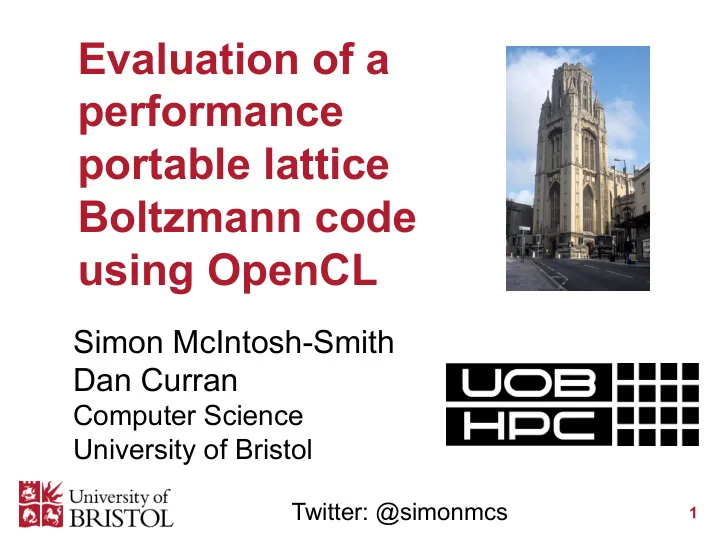

Evaluation of a performance portable lattice Boltzmann code using OpenCL Simon McIntosh-Smith Dan Curran Computer Science University of Bristol Twitter: @simonmcs 1
� Motivation Our BUDE molecular docking code turned out to show strong performance portability: "High Performance in silico Virtual Drug Screening on Many-Core Processors", 2 S. McIntosh-Smith, J. Price, R.B. Sessions, A.A. Ibarra, IJHPCA 2014
� Lattice Boltzmann (LBM) • A versatile approach for solving incompressible flows based on a simplified gas-kinetic description of the Boltzmann equation (used for CFD et al) • A structured grid algorithm • Usually memory bandwidth limited • Ports well to most parallel architectures • We targeted the most widely used variant, D3Q19-BGK 3
� D3Q19-BGK LBM • To update a cell, need to access 19 of the 27 surrounding cell values in the 3D grid 4
� Target platforms 5
� Methodology • Code was extremely efficient but not over complicated • "Identical" versions in OpenCL and CUDA • Single precision grid 128 3 ( ∼ 2m grid points, 304 MBytes) • The OpenCL three dimensional work-group size was fixed at (128,1,1) for all OpenCL runs on all devices. • The CUDA thread grouping was arranged in exactly the same way as the OpenCL execution, with a blocksize of (128,1,1). • The OpenMP code was as close as possible to the OpenCL/CUDA versions • Made sure the OpenMP code was being vectorised 6
� Performance results for 128 3 Single precision results 7
� Performance results for 128 3 67% 57% OpenCL single precision results 8
� So perf. portable, but is it fast? • On an Nvidia K20, our best 128 3 single precision performance in OpenCL was 1,110 MLUPS • In the literature, the fastest quoted results are ~1,000 MLUPS (Januszewski and Kostur's Sailfish program) and 982 MLUPS (Mawson and Revell) • Our results are a 13% improvement over Mawson-Revell and a 10% improvement over Januszewski-Kostur 9
� Other grid sizes OpenCL single precision results 10
� Impact of work-group sizes NVIDIA GPUs AMD GPUs Intel CPU OpenCL single precision results 11
Performance portability isn't what we expect … is it? Why not? 12
� Why don't we expect perf. portability? • Historical reasons • Started with immature drivers • Started with immature architectures • Started with immature applications • But things have changed • Drivers now mature / maturing • Architectures now mature / maturing • Applications now mature / maturing 13
� Performance portability techniques • Aim for 80-90% of optimal • Then easier to get this on many platforms • Aiming for ~100% on a specific platform often results in slower code on other platforms • Avoid platform-specific optimisations • Most optimisations make the code faster on most platforms 14
� Conclusions • 2D structured grid codes such as lattice Boltzmann can benefit from significant performance improvements on many-core accelerators such as GPUs and Xeon Phi • OpenCL can straightforwardly enable a much better degree of performance portability than most people expect 15
� Related Publications • "High Performance in silico Virtual Drug Screening on Many- Core Processors", S. McIntosh-Smith, J. Price, R.B. Sessions, A.A. Ibarra, IJHPCA 2014. doi: 10.1177/1094342014528252 • "On the performance portability of structured grid codes on many-core computer architectures", S.N. McIntosh-Smith, M. Boulton, D. Curran and J.R. Price. To appear, International Supercomputing, Leipzig, June 2014. • "Accelerating hydrocodes with OpenACC, OpenCL and CUDA", Herdman, J., Gaudin, W., McIntosh-Smith, S., Boulton, M., Beckingsale, D., Mallinson, A., Jarvis, S. In: High Performance Computing, Networking, Storage and Analysis (SCC), 2012 SC Companion:. (Nov 2012) 465–471. 16
17
Recommend
More recommend